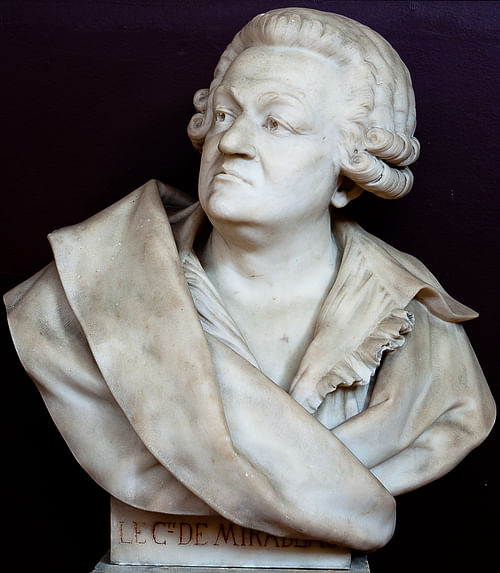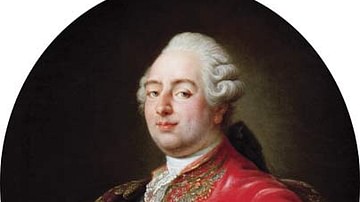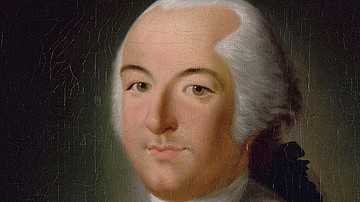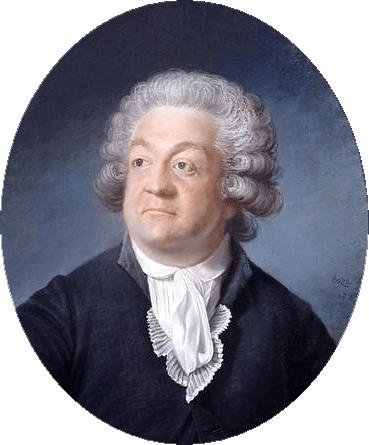
Honoré-Gabriel Riqueti, comte de Mirabeau (l. 1749-1791) was a French orator and nobleman who rose to prominence as a leader during the early stages of the French Revolution (1789-1799). From the disgraced and scandalized son of a distinguished marquis, Mirabeau's oratory skills would carry him to a new reputation as the voice of the people and a national hero.
During the Revolution, Mirabeau advocated for the establishment of a constitutional monarchy based on the model of Great Britain. Despite this moderate position, Mirabeau enjoyed immense popularity amongst the sans-culottes, or lower classes, and was even a leading member of the Jacobin Club, although he would eventually disapprove of the radical direction the Jacobins took under the influence of Maximilien Robespierre (1758-1794).
Mirabeau died of pericarditis in 1791 at the height of his popularity but would soon be cast into posthumous disgrace following the revelation that he had secretly been in the pay of King Louis XVI of France (r. 1774-1792) and Austria, enemies of the Revolution. Even today, many are divided between viewing him as a competent leader who might have saved France from the reign of terror and an immoral traitor in the service of France's enemies.
Early Years
Honoré-Gabriel Riqueti, comte de Mirabeau was born on 9 March 1749 at the Chateau de Bignon in central France. The Riqueti family, possibly of Italian origin, had built their wealth as merchants in Marseille, becoming successful enough to acquire the fiefdom of Mirabeau in 1570. By the time Honoré-Gabriel was born, the family had become quite respected and had a history of military service.
Honoré-Gabriel was the fifth child of economist Victor de Riqueti, marquis de Mirabeau and his wife Marie-Geneviève de Vassan. This marriage was not a happy one, and young Honoré-Gabriel’s fondness for his mother and physical resemblance to her earned him the disdain of his father. When he was three years old, the boy suffered a smallpox attack that left his face disfigured, only solidifying the marquis' dislike of him. Eager to be rid of his son, the marquis eventually sent him off to a strict boarding school in Paris.
In 1767, after finishing his schooling, Mirabeau joined a cavalry regiment. At 18 years old, he would later be described by French writer Victor Hugo (1802-1885) as being in possession of "an impressive and electrifying ugliness" on account of his large, smallpox-scarred head (Davidson, 13). Mirabeau's physical disadvantages hardly impeded his womanizing, a pastime that seemed to always get him into trouble. Shortly after enlisting with the cavalry, Mirabeau became romantically entangled with a colonel's wife, causing a scandal and earning Mirabeau a short prison stint.
He was released in time to serve in the French invasion of Corsica in 1768, during which time he conducted a detailed study of the island and learned about Corsican traditions and customs. This natural inquisitiveness and interest in the lives of common people would later help endear him to the public as a revolutionary leader.
Upon returning from Corsica, Mirabeau attempted to regain his father's favor by marrying Émilie de Marignane, a rich heiress, in 1772, but his extravagant lifestyle and outstanding gambling debts undid any of this intended goodwill. This mounting debt, as well as further behavioral misconduct, led to Mirabeau's countryside exile and eventual imprisonment, under a lettre de cachet obtained by his father. Such a letter, signed by the king, was used to enforce judgments and allowed subjects to be imprisoned without trial or appeal.
Mirabeau was first imprisoned in the Château d'If outside Marseille in 1774, before being transferred to Fort de Joux in the Jura Mountains. While at Joux, Mirabeau received permission to take occasional trips to the nearby town of Pontarlier, where he met Marie-Thérèse de Monnier, who he referred to as "Sophie". The two soon fell in love and escaped together to Amsterdam, where Mirabeau made a living as a hack writer. Meanwhile, the town of Pontarlier had sentenced him to death for the seduction and abduction of Sophie. To avoid this fate, Mirabeau submitted to another lettre de cachet and allowed himself to be arrested by French police in 1777.
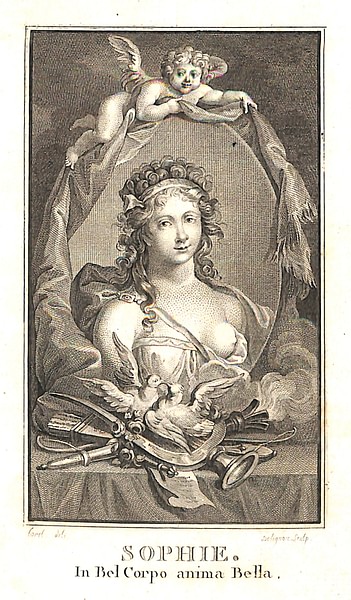
This time, Mirabeau was taken to the dungeon of Vincennes, where he would remain for the next three years. While imprisoned there, he began to write, starting with his erotic work, Letters to Sophie. He also wrote a political essay on lettres de cachet and state prisons, in which he argued that such letters were not only morally unjust but also constitutionally illegal. This political essay was followed by another, Advice to the Hessians, in which he urged Great Britain's Hessian mercenaries to not fight against American rebels during the American Revolutionary War (1775-1783). After his release in 1780, it seemed that Mirabeau was ready to leave behind his aimless life for a new one as a writer.
Forging a New Reputation
Mirabeau had barely tasted freedom when he found himself again embroiled in legal troubles, this time on account of his own wife. Émilie had come to form a distaste for her womanizing, gambling husband and filed a case for judicial separation in 1782. The influence of Mirabeau's father, alongside his own history of unsavory behavior, turned the judges of the court against him, and he lost the suit. Although now a free man, who had managed to get his death sentence revoked, Mirabeau was also utterly alone, as Sophie had ended their relationship and run off with an army officer just after his release from prison. With nowhere else to go, Mirabeau departed first for the Dutch Republic, then for England.
He continued to write and gain notoriety. His treatise on lettres de cachet had become popular in London, and he was admitted into the Whig literary and political society. Mirabeau's skill with a pen was soon noticed by prominent figures in his home nation, and he was commissioned by Controller-General Charles Alexandre de Calonne (1734-1802) to write pieces attacking Jacques Necker (1732-1804), Calonne's predecessor and rival. At one point, he worked with Benjamin Franklin (1706-1790), Founding Father and representative of the United States, and made friends with future French revolutionary figures such as Georges Danton (1759-1794). In 1788, he joined the Société des amis des Noirs, a group advocating for the abolition of slavery.
His work earned him the attention of the powerful French foreign minister Comte de Vergennes, who commissioned him on a secret mission to Berlin in 1786 to craft a report on the state of the Prussian court. The finished account, published the following January as A Secret History of the Court of Berlin, was a scathing denunciation of the corruption and incompetence of the court of a dying King Frederick the Great of Prussia (r. 1740-1786).
The year his controversial report was published, the Assembly of Notables of 1787 was called to discuss important financial reforms as France was rapidly hurtling toward bankruptcy. Now notoriously known as a pen-for-hire, Mirabeau contributed to the event by writing pamphlets attacking his former patron Calonne, helping to secure the controller-general's downfall. The assembly concluded that only a meeting of the Estates-General had the authority to approve such sweeping reforms, and King Louis XVI reluctantly scheduled one to meet in 1789. The Estates-General, a meeting of elected deputies representing the three estates of pre-revolutionary France, (clergy, nobility, and commoners), was too great an opportunity for any ambitious man to pass up.
Since Mirabeau was barred from election as a deputy of his own Second Estate, as he personally owned no land, he instead ran as a deputy for the Third Estate. Scorned all his life by members of his own class, Mirabeau uttered ferocious denunciations against the privileged classes, his oratory skills winning him the election in both Marseille and Aix-en-Provence. Choosing to represent the latter, Mirabeau was present for the opening of the Estates-General of 1789 in Versailles, where he would solidify his place in history.
Voice of the People
Mirabeau had no trouble standing out, even in so large a crowd as that gathered for the Estates-General. His reputation, as both a knowledgeable, capable writer and as a scandalized, debt-ridden womanizer preceded him. His public-speaking ability, greatly refined over the years, made him impossible to ignore; in his own words, "when I shake my terrible mane, no one dares interrupt me!" (Davidson, 13).
As the Estates-General meeting progressed, the conversation began to shift away from financial reform and toward the inequality within French society, specifically the privileges of the upper two estates compared to the burdens of the Third Estate, which constituted over 90% of the French population. Some, such as Abbé Sieyès, took the radical position that the Third Estate constituted an entire nation by itself and that the other estates were but dead weight. Mirabeau, still scathing from his rejection by the Second Estate, applauded this opinion.
Along with a handful of others, Mirabeau and Sieyès would become recognized as leaders of the Third Estate's plight, even as that Estate clamored for the convening of a national assembly and the creation of a new constitution. On 23 June, amidst this tense atmosphere, a royal representative demanded disgruntled members of each of the estates return to their separate chambers at the end of a royal session. To this command, Mirabeau famously responded, "Go and tell those who have sent you that we are here by the will of the people, and can only be made to leave by the force of bayonets" (Davidson, 21). This dramatic answer, referred to by French historians as "Mirabeau's retort", served as a challenge to the legitimacy of royal authority. The following day, most of the clergy joined the Third Estate, as did 47 nobles, and a National Assembly was soon formed.
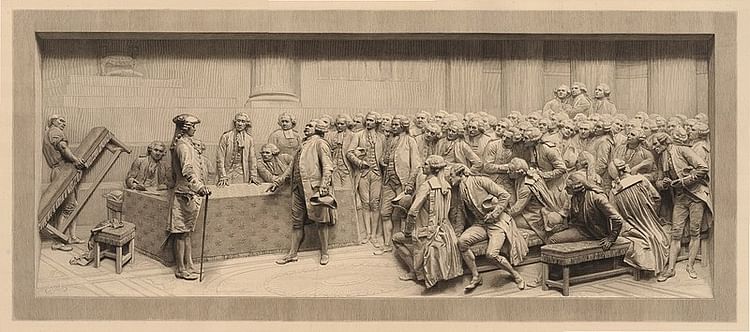
Mirabeau disapproved of the Storming of the Bastille on 14 July, but he did urge the dismissal of the ministers who were to blame for the upheaval. On 4 August, the Assembly abolished feudalism in the August Decrees, while it worked to craft a new constitution. Mirabeau himself worked on drafts of the Declaration of the Rights of Man and Citizen and put forth the motion to confiscate church properties to back the value of the assignat, Revolutionary France's new form of paper currency. He defended these and other revolutionary victories in powerful speeches during late 1789 and early 1790.
Mirabeau was an advocate for a constitutional monarchy and urged the creation of a system of government like the one used by Great Britain. This was not an unpopular opinion in the early months of the Revolution, as many believed a king was still needed to provide the state with legitimacy. In October, the Women's March on Versailles forcibly relocated the royal family from Versailles to the Tuileries Palace in Paris. Many of the march's participants had been demanding a constitutional monarchy, and Mirabeau began to outline his idea of such a system. In consultation with allies of the crown, Mirabeau envisioned a government including himself and the Revolution's most prominent figures. This plan was leaked to the Assembly, who voted on 7 November 1789 to ban all assembly members from becoming royal ministers, effectively thwarting Mirabeau's plan.
Final Years: Revolutionary Monarchist
In July 1790, Queen Marie Antoinette (l. 1755-1793) met with Mirabeau in the privacy of the Château de Saint-Cloud, 5 km (3 mi) west of Paris. The queen harbored a disdain for the man, having previously referred to "the horror that his immorality inspires in me" (Fraser, 313). However, Marie Antoinette was in no place to be picky of her allies, and Mirabeau, as popular as she and the king were hated, would be an invaluable friend. By now, the king and queen had become virtual prisoners in their own palace, at the mercy of the Assembly and the Marquis de Lafayette (l.1757-1834), commander of the National Guard and the royal family's effective jailor. Although their situation was nowhere near as bad as it would soon become, it was becoming clearer that they would need help to reclaim royal authority.
Mirabeau agreed to serve the king and queen as their secret advisor, in return for the king paying off his debts, which now sat at the staggering sum of 208,000 livres. Louis paid off Mirabeau's debts using Austrian money, agreeing to give him further monthly payments of 6,000 livres, with promises of more to come. Mirabeau would not have viewed this as the king paying him off. Indeed, he believed the Revolution had achieved all its goals in 1789 and saw himself as one of the king's ministers, charged with creating a constitutional monarchy compatible with the new revolutionary reforms. As early as May 1790, Mirabeau defended the king's authority before the Assembly, urging that Louis XVI retain his right to have a say in war and peace and keep his power of absolute veto. This behavior, combined with Mirabeau's suddenly improved lifestyle, did not go unnoticed, and pamphlets circulated the streets of Paris calling him a traitor. Still, Mirabeau enjoyed enough support to be elected president of the Jacobin Club in 1790.
In his capacity as a secret royal advisor, Mirabeau came up with a plan on how to save royal authority, which was the only way, in his opinion, of preventing a civil war. He advocated, albeit unsuccessfully, for the repeal of the decree that forbade assembly members from becoming royal ministers, believing such a division would only cause hostilities between a legislative body and the king's cabinet.
Mirabeau also plotted to undermine Lafayette who, despite being a constitutional monarchist himself, had been a rival of Mirabeau's ever since spurning his offer of political alliance in 1789. Even worse, in Mirabeau's view, Lafayette had shown his ambition by putting the king in a secondary role during the 1790 Fête de la Fédération, taking center stage for himself. Since Lafayette derived his power from the National Guard, a force tasked with maintaining order in Paris, Mirabeau figured that moving France's capital to another city would deprive Lafayette and other rivals of their sources of power. Moving the king somewhere else would also keep him safe while tensions in the city fizzled out on their own.
In the end, as Mirabeau sought to reconcile Revolution with monarchy, his attempts would falter. Stubborn Louis XVI showed little enthusiasm for collaboration with the Assembly, while fewer assembly members cared to work with the king as time went on. Even as "at court [Mirabeau] pleaded in favor of the Revolution…and in the Assembly he pleaded on behalf of the king", the Revolution seemed to be moving too fast, and the possibility of reconciliation was quickly slipping away (Furet, 271). Mirabeau began to face constant attacks from within the Jacobin Club, while the radical newspapers denouncing him doubled down.
In the meantime, Mirabeau maintained his hold on the Assembly. He walked the fine line between compromising the tense relations between France and the neighboring nations while also making sure not to disavow any of the Revolution's political victories in the process. Yet, even in his final months, he was as sharp-tongued in the Assembly as ever. His actions to protect the king's aunts, who had fled Paris, as well as his hostility to a law against the émigrés, caused an uproar against him in the Assembly. Accused at one point of resembling a dictator, Mirabeau responded, "all my life I have fought despotism and I will continue to fight it." When a few assembly members grumbled at this, he snapped, much like a schoolteacher scolding unruly children, "Silence, those thirty voices!" (Schama, 541).
On 25 March 1791, after spending the night with two dancers from the opera, Mirabeau was struck with violent intestinal cramps. What his personal physician, Cabanis, originally brushed off as a night of sexual excess turned out to be something more, as the pain grew worse. He continued to deteriorate until, on the morning of 2 April, Mirabeau told Cabanis that he wanted a shave since "my friend, I will die today" (Schama, 543). A few hours later, he was indeed dead, aged 42. An autopsy confirmed he died of lymphatic pericarditis.
Legacy
Mirabeau's death was met with national mourning, as he was thought of as a national hero and a father of the Revolution. He received a grand burial in the newly constructed Panthéon, a mausoleum for distinguished French citizens. Yet neither his glorious reputation nor the monarchy would survive for long. During the trial of Louis XVI in 1792, it was revealed that Mirabeau had been secretly working with the king. He was denounced by Robespierre, now one of the most influential Jacobin leaders, and his remains were taken from the Panthéon and buried in an unmarked grave. Despite searches for his remains in 1889, nothing was ever found.
The death of Mirabeau made the defense of the monarchy much more difficult, although some historians argue that the monarchy would not have been salvageable even if he had lived. Still, he was inarguably a strong and capable leader, who went from a scandalized prisoner to one of the most popular men in France, widely adored at his death. Like many other French revolutionary leaders, he remains a controversial figure, seen as alternatively a valuable leader or as an immoral traitor. What cannot be denied, however, is his effect on both the course of the Revolution and on French history.


